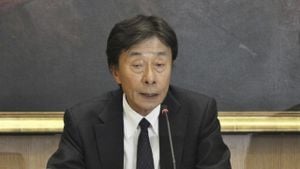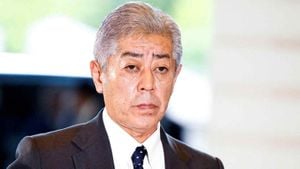Elon Musk generated significant controversy hours after Donald Trump was inaugurated as the nation’s 47th president with a hand gesture made during his speech, which drew immediate comparisons to a fascist salute.
During a post-inauguration event at Washington, D.C.’s Capital One Arena, Musk thanked the crowd for their contributions, stating, "Thank you for making it happen. Thank you." He placed his hand over his heart and then thrust his arm out straight and stiff with his palm facing down, mimicking gestures historically associated with Nazi salutes.
This incident occurred shortly after Trump’s inauguration, where Musk was highly visible and had pledged significant support for Trump’s election efforts. His gesture sparked swift scrutiny across social media platforms, with some observers likening his movements to those of fascist symbolism.
Prominent outlets like CNN, Politico, and PBS NewsHour were quick to report on the gesture, questioning whether it was intentional. The Anti-Defamation League (ADL), dedicated to combating anti-Semitism, weighed in, noting, "It seems [Musk] made an awkward gesture in a moment of enthusiasm, not a Nazi salute," emphasizing the need for grace and mutual respect during tumultuous times.
Public reaction was split. Some expressed outrage, believing Musk's gesture was deliberate, whereas his supporters defended him, claiming it was misinterpreted. Musk remained silent on the issue initially but echoed thanks on the ADL's X post, thanking them with "Thanks guys," followed by a joyful emoji.
U.S. Rep. Alexandria Ocasio-Cortez criticized the ADL's assessment, arguing there was no room for ambiguity. She asserted, "Just to be clear, you are defending a Heil Hitler salute... People can officially stop listening to you as any sort of reputable source now. You work for them. Thank you for making it crystal clear to all."
Musk's support for Trump includes contributing at least $250 million to his 2024 campaign. Following this event, Musk was appointed to lead the initiative known as the Department of Government Efficiency, also provoking discussion due to the acronym DOGE, which reflects the cryptocurrency Musk has been associated with.
Observers, including journalists like Anne Bagamery, highlighted the historical insensitivity of Musk’s gesture during times of political celebration, particularly for those familiar with the ramifications of such symbolism.
Fans of Musk were quick to defend him, arguing he was expressing goodwill—the message accompanying his upbeat demeanor and words. Comments across social media ranged from supportive to accusatory, with many defending Musk by claiming he was not using the Nazi salute and was instead conveying, "my heart goes out to you."
This dynamic has provoked discussions about the interpretation of gestures, the weight of political symbolism, and the broader societal impacts of public figures, particularly Musk, who has moved seamlessly between different political alliances.
The controversy surrounding Musk’s hand gesture reflects broader tensions within political discourse, especially surrounding those affiliated with far-right movements or who share sentiments conducive to radical depictions of nationalism.
Despite the backlash, Musk continued to promote visions for future technologies and projects during his speech, emphasizing hopes around safe cities and securing borders alongside ventures like colonizing Mars.
It raises questions about the impact such controversies can have on political affiliations and public personas—especially for someone of Musk's stature, who has maintained presence at the forefront of technological advancement, social media innovation, and political dialogue.
The line between political expression and historical reference is increasingly complex, particularly as social media catalyzes instantaneous reactions and interpretations from diverse audiences across the globe.
Moving forward, the fallout from Musk's gesture remains to be seen, both on his standing within political and populist discourse and among those who view such actions as trends of inciting division or unification.



